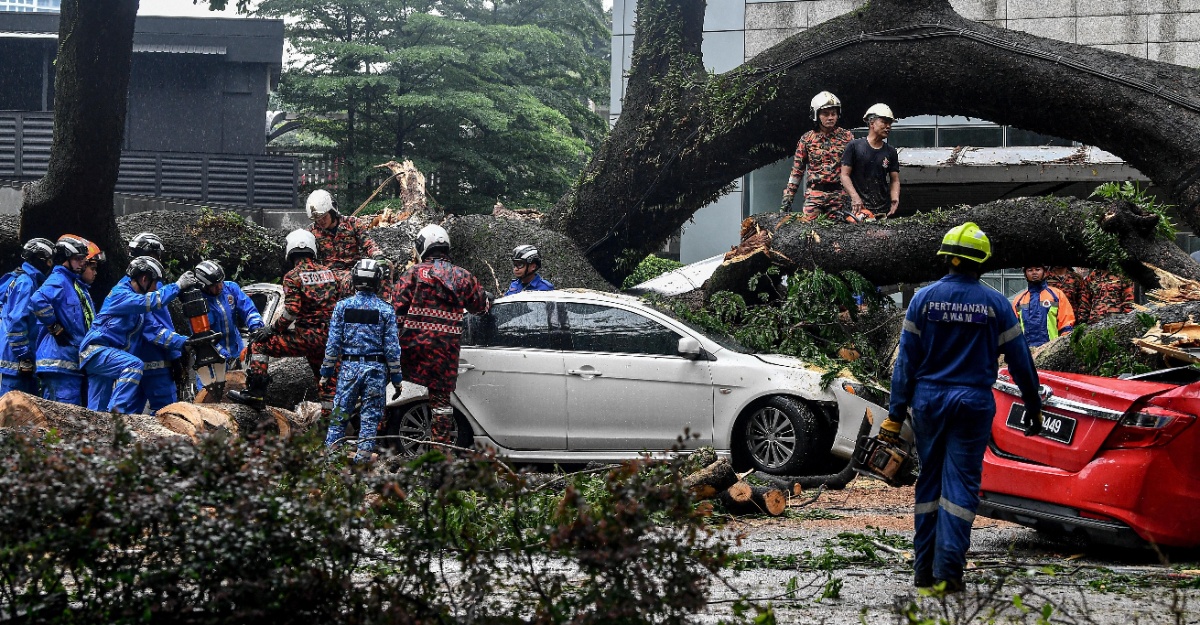On 7 May, a 50-year-old tree fell on Jalan Sultan Ismail, Kuala Lumpur, due to sudden heavy rain and strong winds. Sadly, this led to a loss of life, several injuries, and significant property damage. WWF-Malaysia extends our heartfelt sympathy to the affected families and expresses profound sorrow over this event.
Following this incident, as well as a few others within the past week, Kuala Lumpur City Hall (DBKL) is enhancing its Shade Tree Management Plan and preparing new guidelines for managing old and high-risk trees, expected to be completed by July this year. Apparently 175 high-risk trees – mostly over 50 years old – have been identified, with 147 already cut down. Regular inspections by certified arborists have reportedly identified 28 more high-risk trees slated for removal. In response, Prime Minister Anwar Ibrahim announced that 100 trees must be planted for every one cut in Kuala Lumpur.
To prevent further tragedies, we urgently need to address the resilience of our cities and the underlying causes. WWF-Malaysia believes that applying Nature-based Solutions (NbS) can enhance the safety and sustainability of our urban environments.
Trees play a crucial role in urban areas. Apart from being visually appealing, they mitigate the urban heat island effect by providing shade and cooling the air. According to the Food and Agriculture Organisation of the United Nations, strategic placement of trees in urban areas can cool the air by up to 8 degrees Celsius and reduce air conditioning needs by 30%. Trees also improve the local climate, helping to save energy used for heating by 20% to 50%.
Additionally, trees play a part in removing harmful pollutants in the air and storing carbon which helps to mitigate the impacts of climate change. They also provide natural habitats for birds, squirrels and other fauna, as well as reduce blood pressure and mental stress. As the climate crisis intensifies, incorporating greenery into our cities is a vital adaptation strategy to combat rising temperatures and improve overall urban living conditions.
Many experts believe that proper tree care – including regular maintenance – is often overlooked. In some cases, the roots of old trees, which are essential for their stability, are cut, compromising their ability to withstand storms. Ensuring that trees receive proper care is critical to preventing future incidents. Additionally, planting the right indigenous trees around cities is essential to promote cool spaces and green cover. These trees need to be resilient varieties that require less maintenance and are less vulnerable to disease, to ensure their growth and survival. Adequate space for root growth and healthy soil conditions are also crucial for the long-term stability and health of urban trees.
To build resilient cities, we need to rethink how we use space and interact with nature. By planting and maintaining trees in our cities, we can create urban environments where nature and human civilisation coexist harmoniously. Working with nature, rather than against it, will help mitigate the impacts of extreme weather and create healthier, more sustainable cities.
We support the call for an improved tree management plan and emphasise the importance of involving experts and stakeholders in its development. We urge interested parties including certified arborists, urban planners, environmental scientists, and communities to ensure the safety and wellbeing of our urban environments. Together, we can build cities that are not only resilient to climate change but also offer a higher quality of life for the people of Malaysia.
WWF-Malaysia








